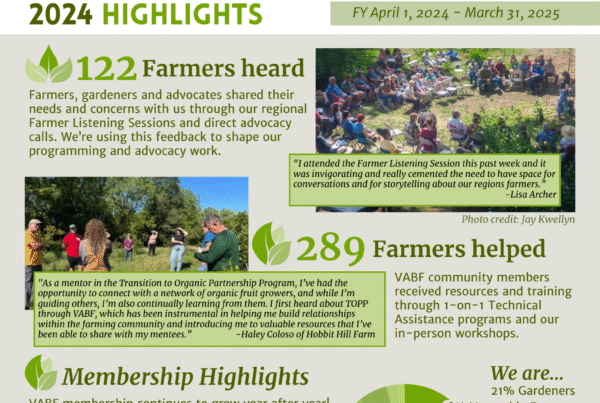Last week, the Farm Bill Conference delivered a 2018 Farm Bill, which both chambers of Congress promptly passed with large, bipartisan majorities.
The final Farm Bill delivered the following wins for family farms, sustainable agriculture, and local/regional food systems:
- Launches the Local Agriculture Markets Program (LAMP), which integrates Value Added Producer Grants and Farmers Market and Local Foods Promotion Program, providing permanent mandatory funding at $50 million per year.
- Launches the Farming Opportunities Training and Outreach (FOTO) program, integrating Beginning Farmer and Rancher Development Program and the Outreach and Assistance to Socially Disadvantaged and Veteran Farmers and Ranchers, with funding increased to $50 million per year by 2023, giving FOTO permanent funding.
- Increases funding for Organic Research and Extension Initiative (OREI) to $50M by 2023, giving the program permanent funding.
- Retains and strengthens the CSP, with increased support for comprehensive conservation planning and high-level conservation practices.
- Expands the Gus Schumacher Nutrition Incentives Program (formerly Food Insecurity Nutrition Incentive) to $56 million per year permanent funding by 2023.
- Reinstates the position of Undersecretary of Rural Development (which had been summarily abolished by the Trump Administration).
- Facilitates SNAP EBT utilization at farmers markets.
- Funds urban farming research, extension, and practical applications.
- Improves beginning and socially disadvantaged producer access to farmland, to conservation cost share, and to crop insurance programs.
Special note, I want to join NSAC in thanking each and every one of you who called, wrote, or e-mailed your Senators and/or Representative urging them to support the above provisions.
A few major disappointments in the 2018 Farm Bill include:
- Failure to close commodity payment limitation loopholes – in fact, the bill adopted several provisions to widen the loopholes.
- Cuts in funding for the CSP, to take effect mainly after 2023.
- Reduction in funding for the Organic Certification Cost Share.
- No provision to fund conservation program monitoring, evaluation, and reporting.
Thank you also for your efforts on these issues on which we “missed the mark” – it is normal not to “win them all,” and our speaking out on these issues will give us more momentum next time the Farm Bill comes around.
For more information, see the National Sustainable Agriculture Coalition (NSAC) blog post at http://sustainableagriculture.net/blog/final-2018-farm-bill-released/, and other entries dated December 12 – present, at http://sustainableagriculture.net/blog/.
Next Steps in Policy Advocacy
Now that the Farm Bill is on the President’s address (and hopefully signed into law by the time you read this), our work in the months and years ahead include:
Work with USDA agencies to ensure that the new and expanded programs “won” in the 2018 Farm Bill are implemented in the most efficacious way possible for family farms, beginning producers, organic, conservation, and local food systems.
Work with USDA agencies to ensure full access to programs for racial minorities and other historically underserved constituencies.
Promote program signups and grant requests for applications widely across the farming community, with special emphasis on helping minority, veteran, beginning and other historically underserved producers and food entrepreneurs access and utilize the programs.
Finally, we will continue to work with the research community to address a threat to agricultural science that has taken shape outside of the Farm Bill process. The issue is the USDA’s proposed relocation of the National Institute for Food and Agriculture (NIFA – administers most of the competitive research and extension grants programs) and the Economic Research Service (ERS – provides vital data on farm program efficacy, racial equity, and more). This move could seriously threaten the capacity of these agencies to fulfill their mandated missions.
Stay tuned! Visit http://sustainableagriculture.net/, and click on the “press”, “blog”, and “Take Action” buttons for updates.
By Mark Schonbeck






